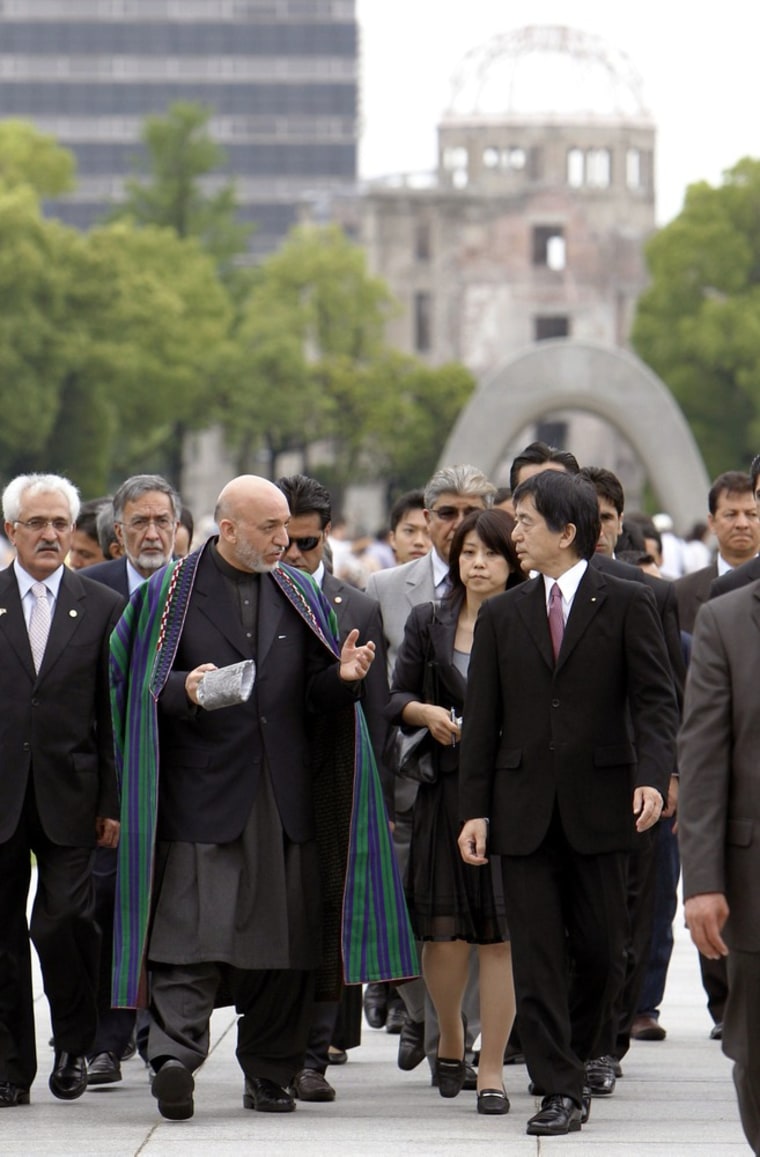Afghan President Hamid Karzai prepared to wrap up a five-day visit to Japan on Sunday after pledging the host nation would be granted priority to explore and extract untapped mineral resources recently valued at more than $1 trillion.
Karzai said the leg up in mineral exploration would be granted in return for the aid Japan has given his nation.
"Morally, Afghanistan should give access as a priority to those countries that have helped Afghanistan massively in the past few years," he said, noting Japan has been his country's No. 2 aid donor.
"What . . . we have to reciprocate with is this opportunity of mineral resources, that we must return at the goodwill of the Japanese people by giving Japan priority to come and explore and extract," he said.
Karzai's remarks were made Friday in a Tokyo meeting organized by the Japan Institute of International Affairs and reported in The Japan Times and other media.
Minerals valued
Geologists have known for decades about Afghanistan's vast deposits of iron, copper, cobalt and gold.
The U.S. Department of Defense this week put a nearly $1 trillion price tag on the reserves, but Afghanistan's Minister of Mines Wahidullah Shahrani called that a conservative estimate. He said he's seen geological assessments and industry reports estimating the nation's mineral wealth at $3 trillion or more.
While Karzai said his country will become "an industrial hub of mineral resources" and "Japan is welcome to participate in lithium exploration in Afghanistan," experts say the figures being thrown around are untested. They also caution it will take years, even decades, for money to materialize because of a host of problems from war and poor infrastructure to a government trying to overcome years of corruption.
Japan is the second-largest donor to Afghanistan after the United States. It has helped Afghanistan reintegrate former Taliban soldiers and has given humanitarian and reconstruction aid to improve infrastructure, education and health. Last November, Japan pledged to give up to $5 billion over five years.
Even with Japan's strong presence in Afghanistan, some experts ask whether it is in a position to take real advantage of the country's mineral riches.
"Right now, the leaders of Afghanistan are on a road show promoting their mineral development. Not a bad thing, mind you, but they need to have a better understanding of how companies decide where to spend the high risk exploration dollars," James Yeager, a geologist and former consultant to the Afghanistan Ministry of Mines, told msnbc.com.
Afghanistan will promote its mining wealth at a "road show" in London on June 25, aiming to boost interest in its major iron ore deposit and other minerals.
"The problem with Hajigak (iron ore deposit) is that it only has two drill holes in it ... and will take a lot of work to bring it into a full feasibility study," Yeager said, adding: "The Japanese are not known as explorationists and risk-takers in developing ore deposits from grass roots through feasibility."
And U.S. companies do not look certain to gain enormously from Afghanistan mineral riches either, Yeager said.
"From the American perspective, the U.S. has invested far more in terms of blood and money than any other country in the world," he said. "However, there is no connection between the U.S. Government and the private mining sector. They do nothing more than regulate the industry."
Karzai was scheduled to meet officials from Mitsubishi Corp. Friday to discuss mining operations.
On Saturday, the Japanese news service Kyodo reported that Karzai paid a visit to Hiroshima ahead of the 65th anniversary of the atomic bombing to observe how the city rebuilt itself.
Afghanistan's leader met with a survivor of the blast and laid a wreath at a memorial for victims of the atomic bomb.
After visiting the area, much of which serves as a reminder of the bomb that practically obliterated the city and helped bring Japan to its knees at the end of World War II, Karzai said that he learned that acts of atrocity must not be repeated.
On Thursday in Tokyo, he met with new Prime Minister Naoto Kan and Emperor Akihito.
